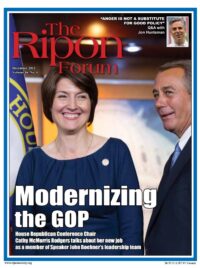
Economists have long been attracted to proposals to broaden the income tax base by limiting deductions and other tax preferences, an approach that has drawn increasing attention since the release of the Simpson-Bowles report in December 2010.
In recent days, the looming fiscal cliff has catapulted income tax base-broadening to the forefront of the tax policy debate. Fortunately, this is an area where Republicans and Democrats should be able to work together. Republicans need to ensure, though, that base-broadening is done right, in ways that reduce government intervention in the economy and avoid aggravating the tax bias against saving.
Emboldened by the election results, President Obama and Congressional Democrats have doubled down on their call to raise taxes on households in the top two to three percent of the income distribution. Despite what some of the Democratic rhetoric suggests, tax increases on that group will not be sufficient to address the long-term budget imbalance. Commentators across the ideological spectrum agree that entitlement spending cuts, tax increases on the broad middle class, or both will also be required. But, it’s likely that a fiscal compromise will include some tax increases on high income earners.
The question is what form the tax increases will take. Democrats prefer to hike the top tax rates. Republicans are rightly pushing income tax base-broadening as an alternative. As the debate progresses, though, Republicans must be careful not to buy into the fallacy that all base-broadening is inherently good. Instead, they must think clearly about the economic benefits that the right kind of base-broadening can offer and tailor their proposals to capture those benefits.
The tax breaks that should be in Republicans’ crosshairs are the ones that give people artificial incentives to change their behavior.
The tax breaks that should be in Republicans’ crosshairs are the ones that give people artificial incentives to change their behavior. These tax preferences divert economic resources away from where the market would direct them, just as many government spending programs do, and they should be held to the same standards as spending programs. Unless the government can demonstrate a legitimate reason to override the market, the preferences should be reformed or eliminated.
The leading examples are easy to identify. Today’s income tax system favors owner-occupied housing over business capital and employer-provided health insurance over cash wages. And, the favoritism is strongest for affluent taxpayers because they’re in the highest tax brackets, where each dollar shaved from taxable income yields the biggest tax savings. These provisions inefficiently encourage the building of bigger homes and the proliferation of Cadillac health plans, drawing capital away from the business sector and driving up medical costs. Capping these tax breaks can curb the excesses while still helping people buy homes and get health insurance. Other tax provisions also distort the economy. For example, the state and local tax deduction and the municipal bond interest exclusion put a thumb on the scale in favor of bigger state and local government.
Reducing distortions of this kind is the real advantage of good base-broadening. Unfortunately, another much-touted advantage is a myth – base-broadening doesn’t raise revenue while magically leaving work incentives unimpaired. Because workers spend part of each extra dollar of wages they earn on tax-deductible items, the deductions soften the tax burden on that dollar and reduce the penalty on work. Taking away the deductions increases the tax burden on the extra dollar, just as rate increases do. Sad to say, base-broadening unavoidably increases the tax penalty on work.
Republicans should remain on guard against proposals to curtail tax “preferences” that ameliorate the saving penalty.
If it’s done right, though, base broadening need not worsen the income tax’s other structural bias: its penalty on saving. Republicans should remain on guard against proposals to curtail tax “preferences” that ameliorate the saving penalty. They should particularly resist calls to increase taxes on dividends and capital gains on corporate stock – because that income has already been taxed at the corporate level, lower tax rates at the individual level are necessary to counteract double taxation.
Income tax base-broadening won’t be easy or painless. Repealing obscure loopholes used by obscure special interests won’t be enough – politically difficult changes to popular tax breaks will be necessary. But, the right kind of base-broadening can limit government interference in the economy, promoting economic growth and making the pain worthwhile.
Alan D. Viard is a resident scholar at the American Enterprise Institute. He previously served as a senior economist at the Federal Reserve Bank of Dallas and an assistant professor of economics at Ohio State University.




